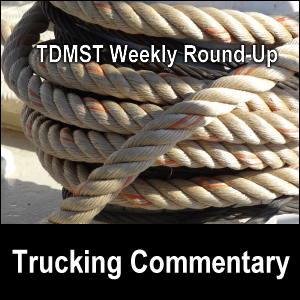This is the TDMST Weekly Round-Up of news affecting professional truck drivers, written by Vicki Simons for the week ending November 9, 2019.
We welcome your comments, thoughts and feedback on the items of your choice below.

1. Regarding major ELD service failure:
Although service has now been restored to almost all Electronic Logging Devices (ELDs) from Omnitracs, the company had to deal with a major system failure earlier this week.
That failure forced truckers using Omnitracs ELD units to revert back to using paper log books.
Other articles about this outage and recovery of services were published:
The CEO of Omnitracs, Ray Greer, apologized “for an electronic logging devices (ELD) failure impacting thousands of drivers and many carriers.”
The system’s GPS systems updates are routinely done without problems, but in this case, a “software service failure” occurred.
Transportation Nation reported that “drivers’ logs from the previous seven days were wiped out and some drivers reported the date on their units reverted back to as far as March of 2000”, but supposedly, all info should be recoverable.
I couldn’t help but chuckle when I read: “The Federal Motor Carrier Safety Administration (FMCSA) is also watching closely.”
I’ll just bet they are!
This “hiccup” in ELD service reminds us that:
- Any electronic service can fail;
- It is always good to keep paper logs on hand to revert to;
- Truckers need to continue being educated about how to use paper logbooks; and
- Paper backups of the last 7 days of on-duty status should be kept on hand no matter what, but how will truckers obtain them?
Although Omnitracs has stated that their system had not been hacked, isn’t it possible that given enough time, any electronic system can be hacked?
And if truckers had to revert back to using paper logs when this system failed, what’s wrong with truckers using paper logs full-time?
Hmm…
That being said, the petition to suspend the ELD mandate has garnered 25,000 signatures.
2. Regarding tariffs and truck parts:
According to a November 5, 2019, article:
There have always been tariffs on imported goods. But typically, tariffs are in the 2% to 4% range, while recent increases in the tariff on goods from China have brought the effective rate on tariffs for most truck parts closer to 30%. That could go even higher if the next round of tariffs is implemented.
Jim Hastie, who is “vice president of product development at CarParts.com, a distributor of aftermarket parts for automobiles and trucks”, was quoted as saying that:
The best strategy for dealing with the increases in parts costs caused by tariffs is a combination of buying better, stretching maintenance cycles where it makes sense, and passing along some of the cost… You can’t do just one of these; it has to be a multi-prong attack.
Another related article stated that “American’s tab for tariffs [reached] $7.1 billion in September.”
This whole situation about tariffs on truck parts makes me wonder if 3-D printing of truck parts will be needed in greater and greater quantities.
In other words, why import it if the truck part can be 3-D printed?
Of course, not all truck parts can be made of the type of plastic that 3-D printers use, so let the buyer beware.
3. Regarding first revenue-generating drone delivery:
“UPS subsidiary UPS Flight Forward successfully completed its first revenue-generating drone delivery of a medical prescription from a CVS pharmacy directly to a customer’s home in Cary, North Carolina on Nov. 1, 2019,” states a November 5, 2019, article.
While I predict more and more products being delivered by drone in the years to come, it is possible that the vast majority of truck shipments will never be delivered by drone due to:
- the weight of the products; and
- the volume of products needed.
It will be interesting to watch drone manufacturers test the limits on just how much weight their machines can handle.
Perhaps one day, truck parts will be delivered by drone!
If you’ve ever waited to have your truck repaired because a part was being shipped to the repair facility, you may understand how this service could one day benefit you.
4. Regarding increased fleet operating costs:
A November 4, 2019, article stated, “Operating costs were up across the board last year, costing fleets an average of $71.78 per hour to run freight, according to the American Transportation Research Institute’s latest Operational Costs of Trucking report.”
The “average marginal cost per mile… increased 7.7% in 2018 to $1.82 per mile”.
This article reported:
- “Driver wages: 59.6 cents per mile, $23.50 per hour (7% increase).”
- “Driver benefits: 18 cents per mile, $7.10 per hour (5% increase).”
A November 8, 2019, article described four aspects of being “paid well and paid fairly“.
More on the topic of drivers’ wages and benefits was written here.
Quick question: Truckers, have you seen your wages increase 7% in the last year?
Please comment below.
5. Regarding Veterans Day deals for truckers:
According to a November 6, 2019, article:
“Many places are offering free coffee, meals, desserts, entrees, or general discounts in honor of Veterans Day.”
Recall that Veterans Day is coming up on Monday, November 11.
Check out the article for specifics, but be sure to verify details on each offer.
6. Regarding free Thanksgiving meal for truckers:
According to a November 5, 2019, article:
“As it has for many years, the Boise Stage Stop in Idaho is showing its appreciation for truck drivers with a free Thanksgiving dinner on the holiday, Nov. 28.”
Thank you, Boise Stage Stop!
We appreciate your support of truckers. 🙂
7. Regarding bad winter weather and the FMCSA’s response:
A November 5, 2019, article stated, “The National Weather Service, the Weather Channel and Accuweather are all forecasting true winter-like weather for much of the northern U.S. in the next several days.”
Furthermore, the FMCSA has issued an emergency declaration for eight states listed in a November 4, 2019, article, due to heating fuel availability being decreased.
The parts of the FMCSR that are being suspended include “haulers transporting heating fuel, including propane, natural gas and heating oil, or providing other direct assistance, into eight Midwestern states.”
More about this topic was written here.
If you are one of those truckers who will drive under this suspended Hours of Service situation, please be aware that:
- winter traveling conditions can become treacherous,
- you need to get good sleep daily, and
- no load is worth your life.
8. Regarding new overtime rules:
According to a November 6, 2019, article:
“New rules will make 1.3 million Americans newly eligible for overtime pay, says the U.S. Department of Labor, and that will affect transportation companies nationwide. The new rules begin Jan. 1, 2020.”
Most truck drivers may not be impacted, but you may want to check to see what impact it has on your situation.
9. Regarding Truckers Christmas Group:
According to TruckersChristmasGroup.org, “The Truckers Christmas group began in 2008 by Truckers who wanted to help Truckers and their families that have fallen on bad times, have a better Christmas.”
They further state that they have “raised $90,000 and helped 154 trucking families in need over the last 11 years and we would love to help even more this year.”
They are now getting ready for their 2019 fundraising drive.
If you feel so inclined to donate, please check out their website.
10. Regarding video cameras in trucks:
According to a November 8, 2019, article, “More than 40% of trucking fleets now use video cameras in their cabs, according to a new study.”
The article did not say what percentage of the fleets had forward-facing vs. cab-facing video cameras.
While I recognize that some trucking companies use cab-facing video cameras:
- to record trucker actions just before and during an accident;
- as a tool to vindicate their truckers who were doing everything right; and
- even for training purposes;
some people feel that they are an invasion of privacy.
What do you think, trucker?
Has using a video camera in your truck ever saved you money or even your job?
Please comment below.
11. Regarding interactive driver training:
In an article about reinventing the way drivers are trained, two officers within CarriersEdge “think that engaging drivers in the training and making it relatable to their jobs is a more efficient way to teach than having the driver simply watch a video or presentation.”
As opposed to “passive” training (like just watching a video), their training can be described by its “interactivity”, where the trainees interact with the training.
If you have undertaken any kind of interactive driver training, please write and submit a service review.
Thanks!
12. Congratulations!
We extend our hearty congratulations to the 63 drivers of U.S. Xpress who achieved “more than 80 million combined miles of safe driving”:
- 58 of whom were to be named “Million Milers”; and
- 5 of whom have achieved over 3 million safe driving miles.
Way to go!
Meanwhile, don’t forget that “The winner of the annual Owner-Operator of the Year contest, presented by the Truckload Carriers Association and Overdrive, will go home from TCA’s annual convention in March $25,000 richer.”
My husband Mike and I wish you — and all professional truck drivers — safe travels and lots of money saving opportunities on the road.
Return from TDMST Weekly Round-Up: 2019.11.09 to our TDMST Weekly Round-Up Trucking Commentary or our Truck Drivers Money Saving Tips home page.

















